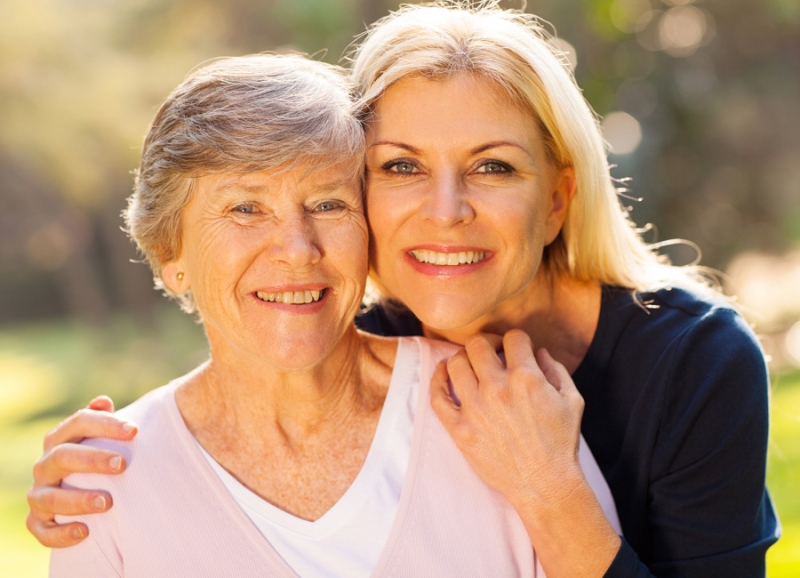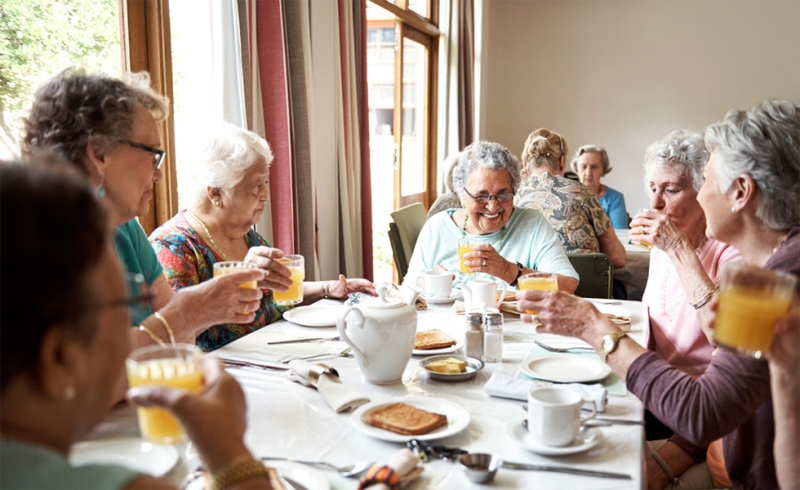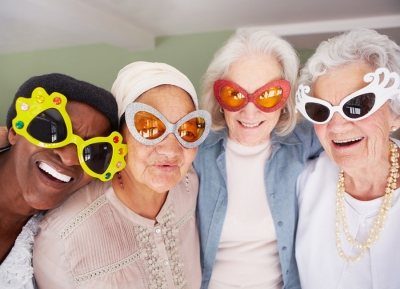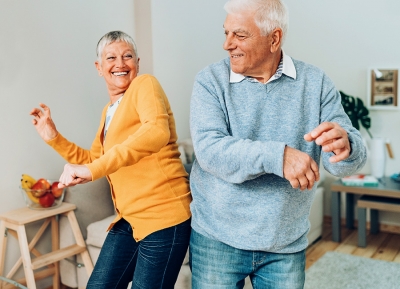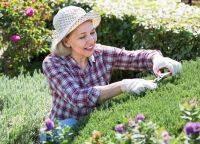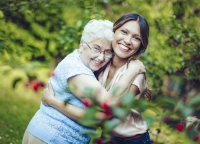Ahh…Autumn in New England. It’s the perfect time of year to fall into the pages of a good story.
What’s your reading pleasure? Is it a heart-pounding thriller or a poignant romance? A perilous adventure story or a hilarious whodunnit? Maybe you’re one for historical fiction or true crime?
No matter the genre, stories are a powerful vehicle for transporting you out of real time and into imaginative places and encounters. But there’s more power in reading than just spurring the imagination: Older adults who are avid book readers are doing a lot to support their health—and they may live longer lives as a result!
Spoiler alert: Don’t miss the book list—featuring dynamic older adult characters, provided at the end of this post!
Book Reading Supports Good Mental and Physical Health
Reading books can enhance both the mental and physical health of older adults in a variety of ways. The benefits presented in the list below come from research that focused on reading books. Magazines and newspapers are a different type of reading experience; while that type of reading has its own benefits, it is not necessarily the same as when reading books. In fact, when comparing people who read books to non-book readers studies show something very interesting: Book-readers have a 20% lower risk of mortality compared to non-book readers. Essentially, book reading adds years to your life span! Here are some of the other important ways reading supports older adult health:
- Reduces stress. When there’s less stress, your body produces less stress hormones and that has a cascade effect on the entire body. Muscles relax. Tension is released. Heart rate and blood pressure are lower.
- Promotes a good night’s sleep. Reading within an hour or two of bedtime helps the body settle down and prepare for sleep. Now, you don’t want to be reading on device as screen blue light negatively affects sleep quality. Also, stick with reading something enthralling, which won’t generate worrisome thought. So, keep work-related reading, the daily news, or financial reports off your nighttime reading list.
- Enhances neural activity. Reading helps the brain forge new neural pathways and strengthen existing neural connections. When you are reading, you’re not away of just how highly active your brain is: The brain is building vocabulary, interpreting context, interpreting characters and their relationships, making connections between the storyline and real life, etc. This neural activity produced while reading promotes brain health.
- Protective against cognitive decline. By supporting neuroplasticity, the brain and mind stay healthier that means reading can be protective against brain changes in older adults that lead to cognitive decline.
- Boosts Creativity. Reading is a creative pursuit in itself. It also helps promote your own creativity by way forging new perspective, inspiring new ways to problem solve, or introducing you to a new creative outlet to try. (How often do you read about something before you decide to sign-up for a class or try it out on your own, at home?)
- Reduces symptoms of mild depression. Reading can promote problem solving, perspective sharing, understanding, and help an individual foster new associations with difficult emotions. As reading helps enhance positive emotions and reduce negative emotions, it has been shown to reduce symptoms of mild depression.
Reading Books as Therapy: Bibliotherapy
You might have heard from someone, or even stated yourself that reading is therapeutic. Now, there is research to back-up the therapeutic value of book reading.
Bibliotherapy is a creative arts therapy devoted to helping an adult or child move through challenging emotional and life experiences. Using books, primarily, but also poetry and picture books; fiction and non-fiction alike, bibliotherapy provides therapeutic, educational, and developmental support with the goal to improve wellbeing, both overall, and in specific situations (school, work, home, social situations, etc.). It can be used when people are recovering from illness, surgery, a traumatic event, as well as when learning to cope with changes to emotional or physical health.
Five Types of Bibliotherapy
- Therapeutic bibliotherapy is used along with psychotherapy and mental health treatment.
- Developmental bibliotherapy is used in schools, homes, and organizations to teach and guide.
- Prescriptive bibliotherapy is used in medical and mental health settings to educate, inspire hope, support behavior modification, and help with acquisition of new skills.
- Creative bibliotherapy is used in groups, such as book clubs or support groups in which literature is discussed for its transformative, educational, or inspirational power.
- Informal bibliotherapy is what we all do when we choose a book because we believe that reading it will help us learn something new or cope better with a given situation.
You might find yourself engaged in informal bibliotherapy upon learning about a new medical diagnosis, or if you are part of a support group for a loved one with Alzheimer’s Disease, or if you are part of a reading group or other type of interest group in your community.
The benefits of bibliotherapy go beyond the benefits of book reading, in general, including but not limited to: helping to reduce clinical symptoms, improve social functioning, reduce loneliness/isolation, instill hope, foster creativity and problem solving, and support recovery.
Books Featuring Older Adult Characters
Having the opportunity to read books that feature characters similar to ourselves as well as those with life experience different from our own is one of the unique features of the reading experience. We asked a few librarians, and we discovered some terrific online resources, to curate this book list—all featuring older adult protagonists, villains, and sidekicks.
Happy Reading!
Romance
- Major Pettigrew’s Last Stand, by Helen Simonson.
An unlikely friendship—and something more—blossoms between the retired Major, a proper Englishman and Mrs. Jasmina Ali, the Pakistani shopkeeper from the village. But can it survive village gossip and the risks one takes when pursuing happiness in the face of culture and tradition? NY Times Book Review
- Mrs. Martin’s Incomparable Adventure, by Courtney Milan
Mrs. Bertrice Martin—a widow, some seventy-three years young—has kept her youthful-ish appearance with the most powerful of home remedies: daily doses of spite, regular baths in man-tears, and refusing to give so much as a single damn about her Terrible Nephew. Then proper, correct Miss Violetta Beauchamps, a sprightly young thing of 96 (ahem, “nine and six”), crashes into her life. When you’re of a certain age, your take on life looks a lot different and Mrs. Martin is going to have the adventure of a lifetime doing things and exploring relationships on her own terms. Author’s Website
Comedic
- The League of Pensioners (series), by Catharina Ingelman Sundberg
In this series, Oceans 8 meets The Golden Girls! The Senior League—five residents of the Diamond Retirement Home—Martha, The Genius, The Rake, Christina and Anna-Greta—turn to a life of crime. You’ll be laughing all the way to the end as you follow this cracker-jack gals through three books in the series. Learn More
Suspense
- Before She was Helen, by Caroline B. Cooney
As the story in this book opens, there’s a retirement-community caper in process. A missing neighbor. A shiny, mysterious object left in place. A photograph that goes viral and an identity long kept hidden faces risk of being exposed. And the dead body pops-up eventually. Things are not always as they seem, and this story quickly evolves into a deceptively dark mystery.
More at Foreward Indie Book Reviews
Horror
- Ghost Story, by Peter Straub
Written by one of the masters of the genre, this gothic-horror tale centers around a single question asked by the four elderly men of the Chowder Society: “What’s the worst thing you’ve ever done?” The question drives the men as they meet to share intensely chilling ghost stories and consume expensive cocktails. But are these stories more than fiction? A chain of mysterious events and death hangs over the Chowder Society. But whose to blame for the suicides and “accidental” deaths that surround them…is something sinister at work? Or is the past finally catching up with the men of the Chowder Society? More books like this at Nightfire
Mystery
- An Elderly Lady is Up to No Good, by Helene Tursten
There’s no other way to describe this book of connected stories than to repeat what Kirkus Reviews wrote: “Five connected stories about a murderous old Swedish lady.” Each tale of main character, 88-year old Maud’s misdeeds (murder, even!) doles out a dose of “senior justice”.
- The Senior Sleuths (series), by Laurien Berenson
Dick and Dora Zimmerman from are sixty-something crime solvers, specially those of the murderous type. You know, like when a dead body body turns up in an ice box with a note that says, "contents rotten." The Zimmermans are lovable characters with the time, money, wit, and "chutzpa” to get involved despite warnings from police and criminals to stay away. There’s a cast of characters-- residents of the condos where the Zimmermans live in Manhattan and Vegas, who all to eagerly seek Dick and Dora's help whenever foul-play is suspected. *adapted from the author’s website)
Resources for Finding Books with Older Adult Characters
We were impressed that across these lists there were very few duplicate books, So if you haven’t found a book you love among our resources, be sure to talk to the staff at Everbrook Senior Living Community about their book resources, book clubs, and special interest groups.
25 Books with Older Adult Protagonists. This list encompasses books written by authors from various backgrounds and featuring different cultural settings, storylines, and genres. You’re bound to find a few to suit your interest.
Midlife BookList on Facebook. Books that show what makes older adults get fired-up, ticked-off, and maintain their sest for life. These books (and there are a lot) reveal the many perspectives that seniors have on the second half of life—their hopes, fears and challenges, and all of it is weaved into a wide variety of storylines, settings, and dilemmas. From humorous to horrific, from all-to-close to real life to purely fantastical, there is something for everyone in this book list.
Must Read Books Featuring Mature Characters. This list features heroes and heroines having incredible adventures that will make you want to celebrate and empathize with them as you reflect on your own life’s journey. From feisty senior ladies and gents to salty old dogs and timeless romantics…there’s a character in these stories for everyone to love!
Learn More about the Health Benefits of Reading
Reading for Stress Relief
Why Reading Books Makes You a Better Person, According to Science. Inc Magazine
Benefits of Reading Books: How It Can Positively Affect Your Life



